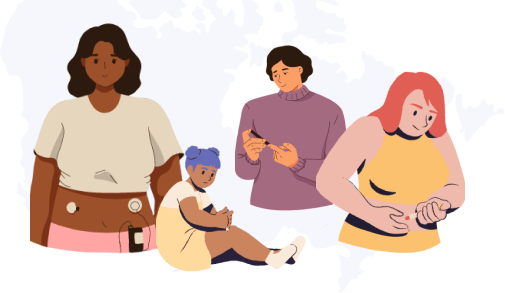Too many people, including some healthcare professionals, misunderstand type 1 diabetes (T1D) and mistake it for type 2 diabetes (T2D). But these are different illnesses that have different causes and treatments.
Type 1 diabetes is an autoimmune disease, which means that it is caused when the immune system attacks healthy cells in the body for no apparent reason. T1D is characterized by the body’s inability to produce insulin following the destruction of the pancreas’s beta cells. The treatment requires multiple insulin injections every day, either with an insulin pump, a syringe or a pen. T1D is not usually linked to other comorbidities. It is diagnosed in people of all ages and all health statuses. People with T1D generally follow the same diet recommendations as everyone else.
Type 2 diabetes is characterized by an insulin resistance that develops gradually over time. This means that even though there is insulin in the bloodstream, the glucose cannot effectively enter the cells. People with T2D don’t necessarily require insulin treatment; oral medication and lifestyle changes (diet or physical activity) are enough for some patients. Type 2 diabetes is often associated with comorbidities, such as obesity and cardiovascular diseases.
Preliminary data of the BETTER registry on stigma
Approximately 450 people with T1D aged 14 or over completed a questionnaire on the stigma associated with T1D.
The following preliminary data caught our attention:
- 9% of respondents said they were rejected at least once by others (e.g., friends, colleagues, lovers) because of their T1D.
- 25% said they felt embarrassed by the material they need to manage their T1D (e.g., insulin pen, insulin pump, blood sugar meter).
- 31% said they were told at least once that they were to blame for having T1D (e.g., because they ate too much sugar, or because they could have avoided it).
- 31% said they felt like they were viewed as irresponsible when they couldn’t manage their diabetes “perfectly.”
- 53% said they receive judgmental comments when they eat sweets or have sugary drinks (e.g., cake, candy, sugary soft drinks) because they have T1D.
What does this data tell us?
It is astonishing to see that half of people with T1D experienced some form of stigma associated with their condition. The confusion between T1D and T2D could be at the root of the problem. But it is important to know that even though T2D is sometimes associated with necessary lifestyle changes, it is still not OK for people with T2D to be discriminated against or stigmatized. They are often on the receiving end of non-solicited advice or opinions on their health and appearance. People with T1D are also targeted with the same stereotypes as those associated with T2D, which are based on the false belief that both illnesses are the same.
Some of these comments may sometimes come from people who are simply interested in learning more and have good intentions. It is a positive thing that those people seek information from a reliable source (the person living with the condition). But it is important to understand and respect that people with T1D don’t always want to discuss their health condition with just anybody.
If you are looking for more information, consider visiting the following websites:
- JDRF Canada: Type 1 Diabetes
- Diabetes Québec: Type 1 Diabetes
- Diabetic Children’s Foundation (FRED): What is type 1 diabetes? and T1D and T2D
Do you want to make your voice heard in the T1D community of the province of Quebec?
Sign up—yourself or your child—for the BETTER registry!
Participate in the BETTER registry!

First registry of people living with T1D in Canada.
Learn More




2 thoughts on “The Stigmatization of People living with Type 1 Diabetes”
Comments are closed.